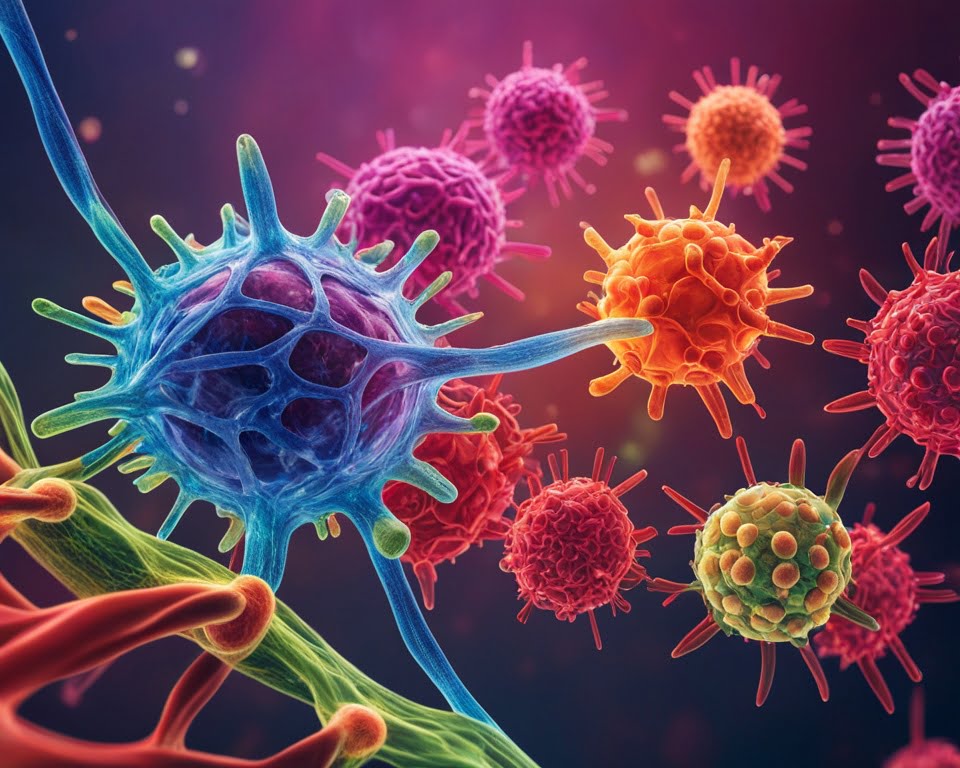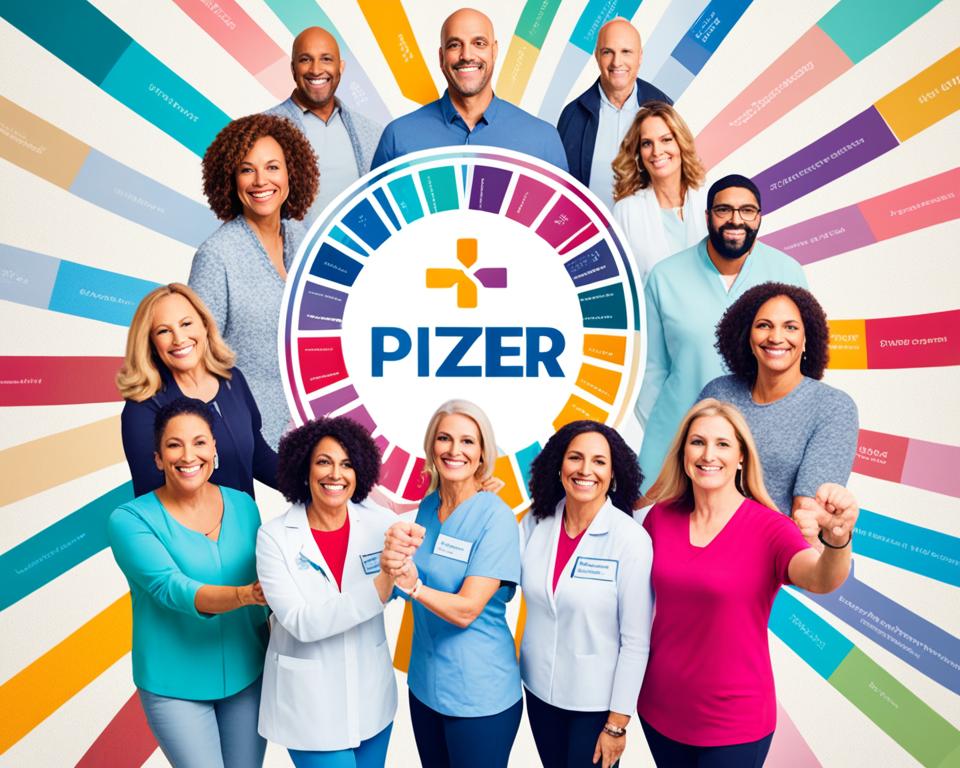
Imagine a future where Duchenne muscular dystrophy (DMD) can be treated, offering hope. Pfizer DMD Gene Therapy is a key player here.1 It aims to bring about life-changing effects for those battling DMD. Let’s take a closer look at how this groundbreaking treatment could revolutionize lives.
Table of Contents
ToggleKey Takeaways
- Pfizer’s DMD gene therapy uses tiny viruses to carry a special gene. This gene helps tackle the root cause of DMD.
- It could lead to more dystrophin being produced, slowing down muscle loss. This might mean better muscle function in the future.
- Tests on boys and older people with DMD have already shown good signs, pointing to the therapy’s wide use.
- With more movement, freedom, and less breathing or heart issues, life for those with DMD could be greatly improved.
- Working closely with patient groups and more trial participation is vital for Pfizer’s gene therapy to keep growing and be successful.
Understanding Duchenne Muscular Dystrophy
Duchenne muscular dystrophy (DMD) is a rare, inherited genetic disorder affecting muscle function. It is caused by mutations in the dystrophin gene. This gene makes dystrophin protein.1 This protein is key for keeping muscle fibers strong.
Without functional dystrophins, the muscle cells can’t keep their shape. They start to break down slowly. This leads to weaker muscles over time.
Rare Genetic Disorder Affecting Muscle Function
DMD mainly affects the skeletal, respiratory, and cardiac muscles. It causes a worsening loss in muscle strength.21 People with DMD find it hard to do everyday tasks. This can eventually lead to severe disability and an early death.
Causes and Symptoms of DMD
The lack of dystrophin protein is what causes DMD. This protein is critical for muscle fibers’ strength.1 Without it, muscles weaken and break down. This leads to the disease’s symptoms, like trouble walking and breathing difficulties.
DMD also affects the heart. It can cause serious cardiac issues. These include heart muscle weakening and an irregular heartbeat.1
Pfizer DMD Gene Therapy Approach
Pfizer is exploring a unique way to treat Duchenne muscular dystrophy (DMD). They’re using a safe virus to carry a special gene.3 This method appears promising because it reaches many body tissues, such as muscles, effectively.3
Adeno-Associated Virus Vectors for Gene Delivery
Their approach, called PF-06939926, employs a specific virus type with a unique protein shell.3 This shell helps deliver the desired gene to specific muscle tissues. This may slow down DMD’s muscle-wasting effects by boosting a key protein.
Micro-Dystrophin Gene Replacement Strategy
This gene carry operates as a mini, yet helpful, version of the full gene.3 Its goal is to create a protein that keeps muscle fibers strong. It’s a step toward fighting DMD.
Pfizer intends to combat DMD’s root genetic issue using this clever method. They aim to provide hope for those with DMD through their innovative treatment.

Clinical Trials and Regulatory Approval
Pfizer’s Pfizer dmd gene therapy is being tested in clinical trials. Its safety and effectiveness are under the microscope. The DAYLIGHT study looks at young boys with DMD, 2 to less than 4 years old.4
The CIFFREO trial, now in Phase 3, targets older DMD patients aged 4 to less than 8 years old. It checks the therapy’s potential in this group.3
Phase 2 DAYLIGHT Study for Young Boys
The DAYLIGHT study, part of Phase 2, focuses on Pfizer’s therapy for young boys with DMD. The aim is to see how much it helps them. This is very important for boys aged 2 to less than 4.4
Phase 3 CIFFREO Trial for Older Patients
The phase 3 ciffreo trial is vital for older DMD patients aged 4 to less than 8 years old. It is a global effort testing Pfizer’s therapy.3 In this study, which is large and detailed, the therapy’s benefits and safety are closely looked at.3
| Trial | Phase | Patient Age | Enrollment | Primary Endpoint |
|---|---|---|---|---|
| DAYLIGHT | Phase 2 | 2 to | Ongoing | Safety and efficacy |
| CIFFREO | Phase 3 | 4 to | 99 ambulatory male patients | Change from baseline in NSAA to one year |
These studies are key in bringing Pfizer’s Pfizer dmd gene therapy to more people with DMD.43
Potential to Improve Muscle Function
Pfizer dmd gene therapy could help make muscles work better in those with Duchenne muscular dystrophy.1 It delivers a special gene called micro-dystrophin into the body using a virus. This gene should get muscle fibers to make a needed protein called dystrophin.1 Dystrophin is key for strong muscles. Without enough of it, the muscles weaken over time.
Restoring Dystrophin Production
Pfizer’s method aims to fix the heart of the issue of Duchenne muscular dystrophy by increasing dystrophin levels.1 The idea started in 1987 when the complete sequence of the DMD gene was first found. The discovery paved the way for therapies to directly tackle the problem by replacing the missing gene part.
Slowing Progression of Muscle Degeneration
Pfizer’s therapy wants to replace the broken dystrophin gene with a working one, called micro-dystrophin. The substitute hopes to slow down muscle damage and boost how well muscles work.5
In a study including 9 boys who could still walk, those who got a high dose of the treatment had on average 51.6% of the normal dystrophin a year later.5 The big jump in dystrophin levels could fight muscle loss in Duchenne muscular dystrophy.
Impact on Quality of Life
Pfizer DMD gene therapy might not only help muscles, but also improve the lives of those with Duchenne muscular dystrophy6. It could slow down muscle damage. This means more movement and freedom, letting patients do more in their daily lives.
Increased Mobility and Independence
The therapy aims to make dystrophin, which strengthens muscles and slows their damage7. Better muscle strength can mean doing things more easily and on their own. This gives those with DMD a chance to enjoy activities they couldn’t before, boosting their life quality.
Reduced Respiratory and Cardiac Complications
Duchenne disease often brings breathing and heart problems7. Pfizer’s method targets the disease at its genetic root. Renewing dystrophins could keep these vital muscles stronger, cutting down these deadly issues and improving DMD patients’ lives.

Challenges and Limitations
Pfizer DMD gene therapy shows great promise. Yet it faces key obstacles and limits.8 One big issue is how to give and how much to give. It’s vital to safely give the AAV vector and the micro-dystrophin gene, as seen in a sad event during the DAYLIGHT study.8 We also need to look out for how the body might react to AAV vectors and the antibodies some might already have. This check-in helps make the therapy as safe and effective as possible.
Delivery and Dosing Considerations
Getting the right delivery and dose of Pfizer DMD gene therapy is hugely important.8 Dealing with making and giving the AAV vector and the gene calls for special attention. Ensuring safety and effectiness means working hard to improve how these are done. This work aims to get the best results with the lowest risk.
Long-Term Safety and Efficacy Monitoring
Understanding safety and how well Pfizer’s therapy works over time is key.8 Short-term results look promising. But to really know, we must study its effects on muscles, life quality, and how the disease progresses. Studying this in trials and after the therapy is approved is vital. It helps assess long-lasting benefits and find any hidden risks.
8 Looking to the future, using animals and advanced gene editing can offer more insights. For instance, CRISPR/Cas9 can enhance our grasp of Duchenne muscular dystrophy. This understanding helps in creating personal and aimed treatment plans.

Collaboration and Community Support
Pfizer’s work on gene therapy for DMD has been a team effort. They worked closely with patient groups and the DMD community. CureDuchenne is a key player that has helped with research, awareness, and support for families.9
Partnerships with Patient Advocacy Groups
Linking biopharma firms with groups like CureDuchenne is key to progress. CureDuchenne helps provide the needed resources and support to the Duchenne community. They also ensure the community’s voice is heard in research.9
Importance of Clinical Trial Participation
Taking part in clinical trials, like the ones Pfizer is running, is crucial. Families and those with DMD contribute greatly to the progress in gene therapy and other treatments. Their involvement is shaping how we care for those with DMD in the future.39

Future Directions and Opportunities
Progress in Pfizer’s Pfizer dmd gene therapy brings exciting chances for treating Duchenne muscular dystrophy better. Researchers are looking into combining gene therapy with methods like oligonucleotide-based therapies and exon skipping strategies.
13% of boys with DMD might benefit from exon 51 skipping, but its benefit is not clear.10 Mixing various treatments might lead to better and personalized care for each patient’s unique needs. Around 5% to 10% of DMD patients could benefit from read-through therapies due to certain mutations.10
Advancing Manufacturing and Delivery Methods
Pfizer is also improving how they make and deliver their pfizer dmd gene therapy. They aim to make the virus vectors that carry the micro-dystrophin gene more reliable. Some Duchenne muscular dystrophy patients have antibodies against this virus.8 Better processes mean more people might get the treatment.
They are also looking into giving the therapy in different ways, like into the veins or muscles. This could help treat more areas of the body. A study shows this treatment improves heart muscle function in certain mice.8 More work in this area could make Pfizer’s Pfizer dmd gene therapy more effective and easier to use.
Conclusion
Pfizer DMD gene therapy is a breakthrough in helping those with Duchenne muscular dystrophy. It uses adeno-associated virus vectors to carry a micro-dystrophin gene.
The goal is to bring back dystrophins and slow down muscle damage.1 This method shows promise in making muscles work better, helping with movement, and lowering the impact of heart and lung problems. It could make a huge difference in the quality of life for many with this disease.4
Work on Pfizer DMD gene therapy is moving forward in clinical trials.11 These efforts point to more ways to treat Duchenne muscular dystrophy. It’s important for the whole community to focus on safety and help those in the trials. This support is key to bringing this therapy to those who need it.11
Pfizer’s way of using Pfizer DMD gene therapy gives real hope to people with this genetic disorder.4111 With gene therapy, the company is fighting the main issue of Duchenne muscular dystrophy. It offers a chance for a better future for those facing this challenge.
FAQ
What is Duchenne muscular dystrophy (DMD)?
Duchenne muscular dystrophy (DMD) is a rare, genetic disorder that affects the muscles. It is caused by a problem with the dystrophin gene, making the body unable to produce enough of the dystrophin protein. This lack of protein causes muscles to weaken and break down over time.
How does Pfizer DMD gene therapy approach address DMD?
Pfizer’s approach uses a special virus to carry a working copy of the dystrophin gene into the body’s cells. This virus is called adeno-associated virus or AAV. The goal is to fix the problem at its root by providing the body with a mini version of the dystrophin gene. This way, muscles can regain some strength and function.
What are the key clinical trials for Pfizer DMD gene therapy?
Pfizer has tested its gene therapy in two important studies: DAYLIGHT and CIFFREO. DAYLIGHT focused on very young boys, from about 2 to less than 4 years old. CIFFREO included older boys, aged about 4 to less than 8 years of age. Both trials look at how well the therapy works and its safety. They form a crucial part of the process before treatment is approved.
How can Pfizer DMD gene therapy improve muscle function and quality of life?
This gene therapy can help the body make some dystrophin protein again. With more protein, muscles can work better. This may help boys with DMD move more easily, become more independent, and lower the risks of heart and lung problems. So, their life quality might get better.
What are the challenges and limitations associated with Pfizer DMD gene therapy?
Challenges include how to best give the virus and gene to the body. Also, making sure it’s safe and effective for a long time is crucial. Continuous monitoring of the therapy’s outcomes and effects on health is important.
How has the Duchenne community been involved in the development of Pfizer DMD gene therapy?
The Duchenne community has worked closely with Pfizer. Groups like CureDuchenne have helped a lot. They’ve supported the research, made more people aware, and fought for those families affected by DMD.
What are the future directions and opportunities for Pfizer DMD gene therapy?
Combining this gene therapy with other treatments is a possible next step. This could make the treatment even better for Duchenne muscular dystrophy. Pfizer is looking at ways to join forces with different therapies to create more tailor-made solutions.
Source Links
- https://www.ncbi.nlm.nih.gov/pmc/articles/PMC8673537/
- https://www.parentprojectmd.org/update-on-pfizers-phase-2-gene-therapy-trial-for-duchenne/
- https://www.pfizer.com/news/press-release/press-release-detail/pfizer-doses-first-participant-phase-3-study-duchenne
- https://www.clinicaltrialsarena.com/news/pfizer-gene-therapy-study/
- https://www.pfizer.com/news/press-release/press-release-detail/pfizers-new-phase-1b-results-gene-therapy-ambulatory-boys
- https://www.ncbi.nlm.nih.gov/pmc/articles/PMC6493713/
- https://www.ncbi.nlm.nih.gov/pmc/articles/PMC9353054/
- https://www.ncbi.nlm.nih.gov/pmc/articles/PMC10325806/
- https://cureduchenne.org/research/update-on-pfizers-daylight-gene-therapy-trial-for-duchenne/
- https://www.mda.org/disease/duchenne-muscular-dystrophy/research
- https://pharmaphorum.com/news/pfizer-pauses-dmd-gene-therapy-trial-after-boys-death
